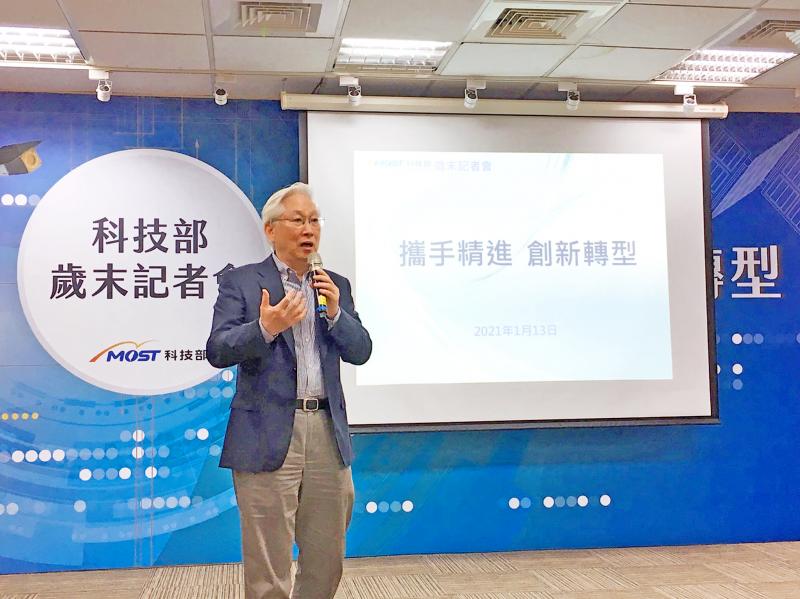Taiwan’s first low-orbit communications satellite would be launched by 2025, and the government has budgeted NT$4 billion (US$140.62 million) for its development, Minister of Science and Technology Wu Tsung-tsong (吳政忠) said yesterday.
The Beyond 5G communications satellite would be jointly developed by the Ministry of Science and Technology, and the Ministry of Economic Affairs, Wu told a news conference in Taipei.
The program seeks to help local companies make inroads into the emerging low-orbit satellite communications industry, led by US rocket supplier SpaceX’s Starlink program, he said.

Photo: Yang Mian-chieh, Taipei Times
Taiwan’s semiconductor, information and communications technology developers are competitive on the global stage and could pave the way for local firms to supply key components, modules and subsystems to communications satellites and related applications, Wu said.
The Beyond 5G’s launch might be conducted by a foreign entity, he added.
National Space Organization Director-General Lin Chun-liang (林俊良) said that his agency, which is part of the science ministry, would work with the economic ministry’s Industrial Technology Research Institute and Industrial Development Bureau on the program.
The institute would develop the satellite’s communications payload, while the space organization is in charge of the development of the satellite’s mechanical components and ground station control, Lin said.
After the satellite is launched, the government would encourage local firms to get involved in the development of six other communications satellites, he added.
The space organization is supporting three CubeSat programs developed by local researchers, Wu said.
The Ionospheric Dynamics Explorer and Attitude Subsystem Satellite, developed by National Central University, and the YuSat, developed by National Taiwan Ocean University and local firms, would be launched on SpaceX’s Falcon 9 rocket on Thursday next week, Wu said.
The NutSat, developed by National Formosa University, is scheduled to be launched in June, Wu said.
The three CubeSats have already been delivered to the US, Lin said.
In related news, the science ministry said it has submitted a space development draft bill for review to the Executive Yuan.
The science ministry is seeking to upgrade the space organization and outsource it from the National Applied Research Laboratories, which is also governed by the ministry, Wu said.

Taiwan has received more than US$70 million in royalties as of the end of last year from developing the F-16V jet as countries worldwide purchase or upgrade to this popular model, government and military officials said on Saturday. Taiwan funded the development of the F-16V jet and ended up the sole investor as other countries withdrew from the program. Now the F-16V is increasingly popular and countries must pay Taiwan a percentage in royalties when they purchase new F-16V aircraft or upgrade older F-16 models. The next five years are expected to be the peak for these royalties, with Taiwan potentially earning

POSITIVE DEVELOPMENT: Japan and the US are expected to hold in-depth discussions on Taiwan-related issues during the meeting next month, Japanese sources said The holding of a Japan-US leaders’ meeting ahead of US President Donald Trump’s visit to China is positive news for Taiwan, former Japan-Taiwan Exchange Association representative Hiroyasu Izumi said yesterday. After the Liberal Democratic Party’s landslide victory in Japan’s House of Representatives election, Japanese Prime Minister Sanae Takaichi is scheduled to visit the US next month, where she is to meet with Trump ahead of the US president’s planned visit to China from March 31 to April 2 for a meeting with Chinese President Xi Jinping (習近平). Japan and the US are expected to hold in-depth discussions on Taiwan-related issues during the

‘LIKE-MINDED PARTNER’: Tako van Popta said it would be inappropriate to delay signing the deal with Taiwan because of China, adding he would promote the issue Canadian senators have stressed Taiwan’s importance for international trade and expressed enthusiasm for ensuring the Taiwan-Canada trade cooperation framework agreement is implemented this year. Representative to Canada Harry Tseng (曾厚仁) in an interview with the Central News Agency (CNA) said he was increasingly uneasy about Ottawa’s delays in signing the agreement, especially as Ottawa has warmed toward Beijing. There are “no negotiations left. Not only [is it] initialed, we have three versions of the text ready: English, French and Mandarin,” Tseng said. “That tells you how close we are to the final signature.” Tseng said that he hoped Canadian Prime Minister Mark Carney

STAY IN YOUR LANE: As the US and Israel attack Iran, the ministry has warned China not to overstep by including Taiwanese citizens in its evacuation orders The Ministry of Foreign Affairs (MOFA) yesterday rebuked a statement by China’s embassy in Israel that it would evacuate Taiwanese holders of Chinese travel documents from Israel amid the latter’s escalating conflict with Iran. Tensions have risen across the Middle East in the wake of US and Israeli airstrikes on Iran beginning Saturday. China subsequently issued an evacuation notice for its citizens. In a news release, the Chinese embassy in Israel said holders of “Taiwan compatriot permits (台胞證)” issued to Taiwanese nationals by Chinese authorities for travel to China — could register for evacuation to Egypt. In Taipei, the ministry yesterday said Taiwan